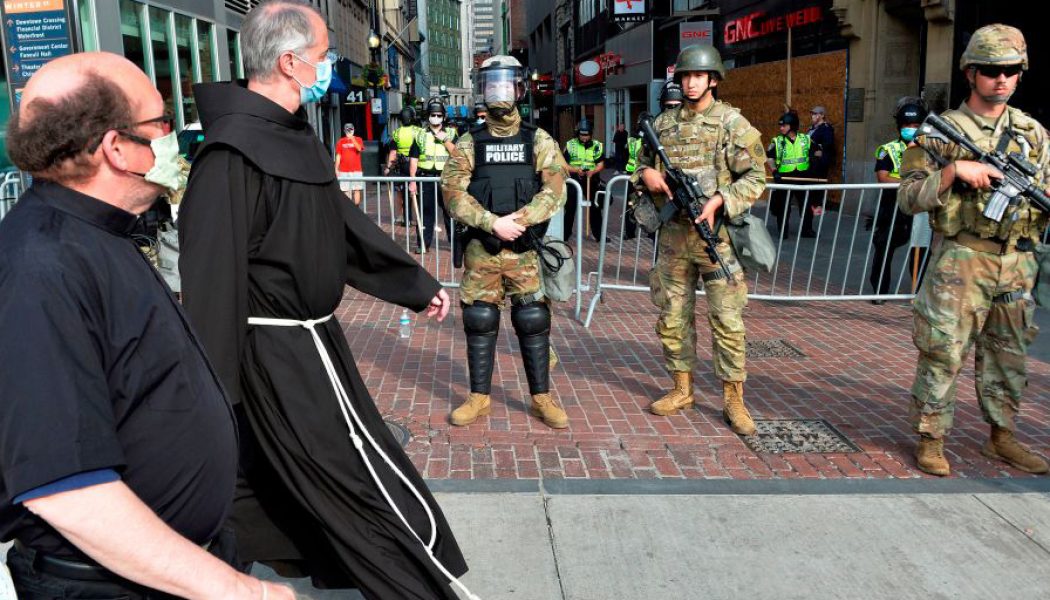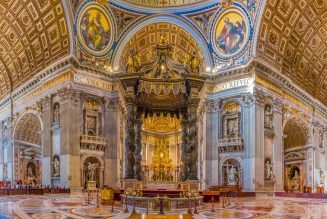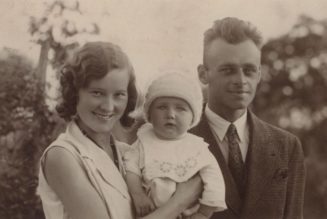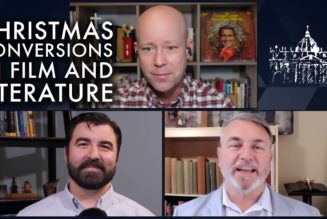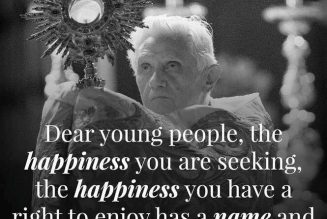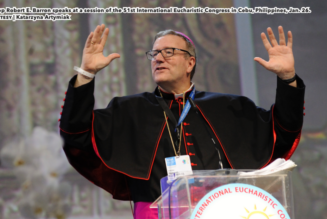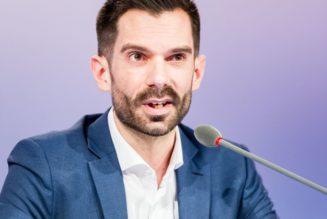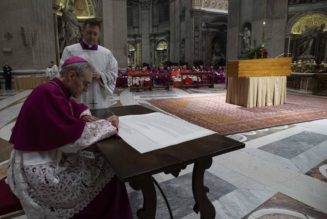
Two priests walk by National Guard Soldiers stationed in downtown Boston on Wednesday. (Photo by JOSEPH PREZIOSO/AFP via Getty Images)
With Cries That Pierce Me to the Heart: A Priestly Testimony of Grief in These Times
COMMENTARY: This moment of shared outrage and unified demands for action has so quickly devolved into partisan hatred, venomous blame-game accusations, racial strife and bitter division.
Msgr. Charles Pope
The death of George Floyd at the hands of four Minnesota police officers is an event that united us all in shock and anger.
As a video recording shows, Floyd’s pleas, and those of bystanders, went unheeded by an unmerciful and reckless officer, abetted by three other officers who didn’t intervene. Outrage and sorrow were the universal reaction by people of all political persuasions and races.
The president, members of Congress, governors, mayors and police everywhere all demanded swift action. The Department of Justice was put on a fast track to investigate this atrocity. All four officers were immediately fired and have since been arrested and charged (the leader, Derek Chauvin, for second-degree murder).
I know of no American who approves of what happens or disputes the facts. It was a terrible event, but also a moment of unity. Everyone saw the horror, and everyone condemned it.
So what happened that this moment of shared outrage and unified demands for action so quickly devolved into partisan hatred, venomous blame-game accusations, racial strife and bitter division? In the words of a Psalm, “I have cries that pierce me to the heart” (42:11). I grieve, even as I hold two groups of very different Catholics in my heart who share a strangely similar concern — namely, that no one seems to understand their pain.
I have served most of my life in predominately African American parishes and I have seen and experienced that racism and racial profiling are very real. Men and women whom I have known and trusted for years speak of the difficulty of hailing a cab, of being subject to special scrutiny in stores, and of an all-too-frequent appearance of flashing blue lights in their rear-view mirror.
I am unaware of what statistics show, but the experience of excessive force, disrespect and outright brutality is widespread among the parishioners I know. They are not hotheads, easily stirred up by activists. Their concerns come from a shared experience, exacerbated by a justice system that is slow and often exonerates offending police officers.
So I know that the concerns are real and the anger is just. And I think we had a moment as a nation where we all saw into the pain and depths of the problem. I think we owe it to George Floyd and to the African American community to remember this moment well, and to allow it to pave the way for legitimate legal reforms, changes in police procedures and the conversion of our own hearts if we were dubious or dismissive of the seriousness and depths of racial injustice which still exists in our time.
I’ve also have wide interaction with Catholics throughout the country who are experiencing grief, disappointment and pain, for different but related reasons. There is a perceived lack of balance and parity by many Catholics who write me — Catholics who share outrage at what happened to George Floyd but are grieved at an outrage that is selective and discriminatory.
For example, in the midst of a pandemic we have been told that gathering in large numbers without proper social distancing was so dangerous that our parishes had to end public Masses altogether. And yet, in the midst of the same pandemic where parishes in many areas must remain closed, the same public officials have praised and supported the protests. This is despite the fact that these large protesting groups set aside nearly every protocol designed to limit the spread of COVID-19.
Meanwhile, our parishes here in D.C. and many other places remain closed since our gatherings are considered far too dangerous. This brings grief and anger to Catholics with whom I have spoken, and a certain sense that the guidelines we will be expected to rigorously follow aren’t really that important. Even many bishops who have supported the protests (despite the reckless abandonment of pandemic norms) are still insisting on the need to keep public liturgies closed or severely limited.
Protests are important — but prayer and worship is even more so. The lack of parity and fairness is a source of grief to many.
The vast majority of protesters were peaceful and orderly. But sadly, as we know, some chose to use the opportunity to riot, destroy, loot and set afire the property of others who did not harm them. While this group might have been small, their actions caused harm to many, including the very community they purport to defend. Some argue that these were outsider groups, and that may be true. But, somewhere in this process it became politically incorrect to condemn such wanton destruction. Many increasingly said that we need to understand the rage and make room for it.
Some have even invoked Martin Luther King, Jr., the great prophet of nonviolent resistance, as saying that “the riot is the language of the unheard.” This is a terrible misuse of a remark by King, who was explaining the rage, not approving of rioting.
The selective outrage of the media world grieves many Catholics, including me. What happened to George Floyd was a moral outrage, a mortal sin. But rioting, physically attacking other people, destruction of property and looting are also grave and mortal sins. Yet many were shamed for alluding to this at all — there were even suggestions that anger at this smacked of racism.
Again, the perceived imparity and selective outrage is a source of anger and grief for many who have reached out to me — as it is, I am sure, for many Americans of every race.
A more grievous wound for many Catholics came at an awkward moment when President Trump went to the Pope John Paul II Center here in Washington, D.C., to take part in a religious liberty program. Archbishop Wilton Gregory wrote to indicate his displeasure at the meeting and the imprudence of holding the meeting at a time such as this. I think he was right in this regard — not for all his stated reasons about the president, but because it seemed badly timed, with the heightened racial tensions and pandemic. It is also curious that the archbishop had not been invited months before, when the meeting was first planned.
But here too, what grieves many Catholics who write to me is that the good archbishop used the strong language they wish he and other bishops would also use in other settings.
Archbishop Gregory said, “I find it baffling and reprehensible that any Catholic facility would allow itself to be so egregiously misused and manipulated in a fashion that violates our religious principles.”
Agree or not, these are strong, vigorous words! But why are such strong, vigorous words not heard in denunciation of other Catholic institutions that have chosen to honor Speaker Nancy Pelosi or Father James Martin or others who “violate our religious principles?”
Many Catholics for decades have lived for the day when any bishop, anywhere, would say, “I find it baffling and reprehensible that any Catholic facility would allow itself to be so egregiously misused and manipulated in a fashion that violates our religious principles” when a dissenting Catholic is given honors or invited to speak at graduations and the like. The seeming double standard grieves and angers many Catholics who write to me.
I write this with deep respect for Archbishop Gregory and I admire the work he is doing to reunite our archdiocese, which has been so rocked by the scandal. But I appeal to all bishops to hear the cry of your faithful who long for just this sort of clarity and strong denunciation when it comes to less “safe” issues such as abortion, same-sex attraction, transgenderism and the like. Your faithful want and need your strength.
So, in times like these I hear and experience a lot of grief. As a pastor, writer and radio host, among other roles, I unite in my heart many people with many and different experiences. And I love them all.
The many African Americans I have loved and served over the years have long carried a sorrow and burden that many do not understand, and we need to learn how to listen and to repent wherever necessary.
And many other Catholics of a more traditional nature whom I have also loved and served have long suffered as well from a sense of unevenness due to selective outrage by their priests and bishops, and silence from these same shepherds on what they deem critical moral issues. Add to this the difficulties in accessing the traditional rites.
Yet here I am. I hold so many Catholics from very different backgrounds and experiences in my heart. And, with sighs and “cries that pierce me to the heart,” I grieve for one and all.
Miserere Deus! O Jesu bone, miserere. (Have Mercy, O God, O good Jesus, have mercy!)
Msgr. Charles Pope is a priest of the Archdiocese of Washington, D.C.
